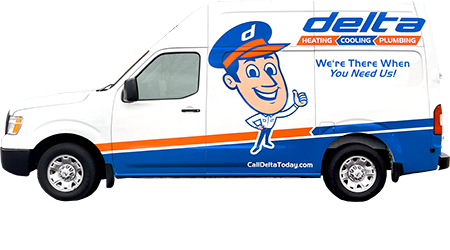The Importance of Managed NC Home Humidity Levels
A managed NC home humidity level can improve the every day Indoor Air Quality of your Raleigh regional home. But why take up the battle?
In this article, the HVAC team at Delta Heating & Cooling provides reasoning behind the purpose for managing the presence of in-home mold, moisture and water.
Hazards of Accumulated In-Home Humidity
Sometimes homeowners tend to overlook the accumulated complications related to high NC home humidity levels. Common associated visuals such as the presence of molds and mildews trigger awareness. But many homeowners fail to remember that excessive daily in-home moisture also encourages an increased activity of ants, dust mites, termites, other insects and a host of unhealthy microorganisms.
Standing water and/or accumulated dampness promotes excessive growth of bacteria and other biological allergen components. Allergic reactions can induce all manner of complications, including:
- Chest Discomfort
- Coughing
- Fever
- Headaches
- Itchy Eyes
- Runny Noses
- Throat Irritations
- Wheezing
- All of which may be linked to a case of Acute Bronchitis
High humidity in North Carolina homes can also weaken the integrity of the house, creating physical damage to the wood, as well as causing quicker rusting in metal components. And damp wood, of course, increases the risks of infestation by carpenter ants, termites, and other wood destroying insects.
Optimum Relative NC Home Humidity Levels
Statistics from the U.S. E.P.A. suggest that the average American spends nearly 90-percent of their time on indoor activities. Thus taking control of your relative in-home humidity reflects an attitude of personal concern for family safety. If managed Indoor Air Quality can minimize growth of various sources of biological complications, why delay protection? For optimum relative NC home humidity levels, the E.P.A. sets the standard at 30-50%. Yet maintaining constant in-home relative humidity is easier said than done.
Although the resources for DIY managed North Carolina Home humidity control are ready available, the process of monitoring and regulating can be somewhat difficult. Some areas within a home and beneath a home tend to generate a greater level of home humidity. Basements and crawl spaces typically accumulate more moisture than do heated regions of the home. Kitchens and bathrooms also tend to generate higher levels of humidity than do the primary living and sleeping regions.
Hygrometers, also called moisture meters and/or relative humidity sensors, help homeowners accurately monitor in-home relative humidity. Without such equipment, identifying humidity problem areas can be extremely difficult. And without correct problem-region identification, effective moisture control cannot be accomplished.
To be accurate, monitoring of in-home relative humidity must include:
- Air Conditioning ductwork
- Attic spaces
- Basement spaces, including cellars and crawl spaces
- Closets
- Every individual room in the home, with special attention to bathrooms and the kitchen
- Inside cabinets and special food storage areas
- And don’t forget to keep an eye on any attached garage space
NC Home Humidity Levels – Control Tips
- Use humidity sensor devices
- Install a correctly sized dehumidifier system
- Seal windows and doors
- Schedule a yearly roof inspection
- Landscape to ensure effective watershed from the foundation of your Raleigh home
- Eliminate all leaking pipes: inside, underside and outside
- Seal the crawlspace
- Dry the basement
- AND be sure to ask your HVAC tech for proper instructions concerning ventilation of your home. Tip: ask about and understand the complications associated with over-pressurization
Delta Heating & Cooling – Preventing Excessive NC Home Humidity Levels
Raleigh-based, family owned and family operated, Delta Heating & Cooling offers NC homeowners the best in local HVAC services, including managed relative humidity control and Indoor Air Quality regulation. Need more help, or have more questions? We’re happy to help – contact our experienced technicians for any of your Raleigh HVAC needs.

